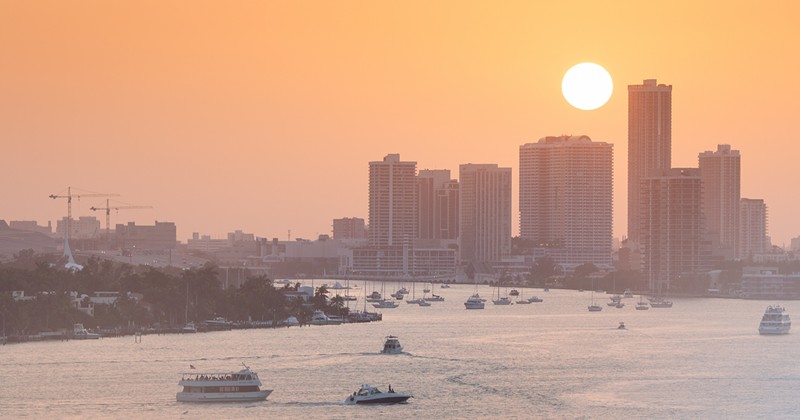On July 17, as Miami marked its 36th day in a row with a heat index above 100 degrees, the National Weather Service (NWS) issued an "excessive heat" advisory, warning of heat indices in the county reaching a scorching 110 to 112 degrees. Issued early Sunday morning and lasting through the evening, it was the first time on record that such an advisory was issued for Miami-Dade, the NWS says.
"I believe this a first...Wow," University of Miami meteorologist Brian McNoldy tweeted.
Oppressive humidity has been combining with toasty temperatures to make the Miami air feel exceptionally sweltering, a National Weather Service meteorologist tells New Times.
"Usually we're lucky in South Florida because we have the ocean next to us. We have a sea breeze, which typically every day in the afternoon, moves off the ocean toward the land and can help drop the temperature," meteorologist Sammy Hadi says.
Hadi says this year, our above-average sea surface temperatures have hampered the sea breeze's cooling effect.
Add in a strong southwesterly flow that has kept a humid air mass around us — and you've got a recipe for a steamy July, according to Hadi.
There's a caveat in that on June 1, the NWS slightly lowered the threshold for excessive heat warnings and advisories in the area, allowing the service to issue an excessive heat warning when the heat index — what the temperature feels like when humidity is factored in — is forecast to remain at 110 degrees or more for at least two hours. (The previous threshold to trigger the warning was a 113-degree heat index for more than two hours.)
Nonetheless, Miami had a record-setting hot month.
According to historical climate data posted by McNoldy, Miami has already set a dozen daily records in July for highest recorded heat index. We've also broken records for highest recorded temperature on five calendar days in July.
It's not just South Florida feeling the heat.An Excessive Heat Warning for Miami-Dade will go into effect later this morning, as heat indices could reach 110°F-112°F for prolonged periods of time across the county.
— NWS Miami (@NWSMiami) July 16, 2023
Heat Advisories also remain in effect for the rest of South Florida through this evening. pic.twitter.com/dWmWGa6J5D
Against the backdrop of global climate change, locations around the world are clocking in some of their hottest days on record, including China — which reportedly just recorded its highest temperature ever at 126 degrees — and the infamously hot Death Valley, California, which just set a new daily average record of 128 degrees.
On Sunday, according to McNoldy, Miami marked its 20th consecutive day with a more than 102-degree heat index.
Scientists have warned for years that Miami's heat will only get worse. In 2019, the Union of Concerned Scientists estimated that by mid-century, global warming would contribute to Miami experiencing a drastically increased number of days per year with a more than 100 degree heat index.
In 2021, Miami-Dade appointed its first "chief heat officer," Jane Gilbert, to help the county deal with extreme heat.
So far in her tenure, Gilbert has helped the county lower thresholds for "heat advisories" and "heat warnings" and install high-efficiency air conditioning units in public housing. She is now working to increase tree canopy coverage with an emphasis on low-income neighborhoods, according to Axios.











